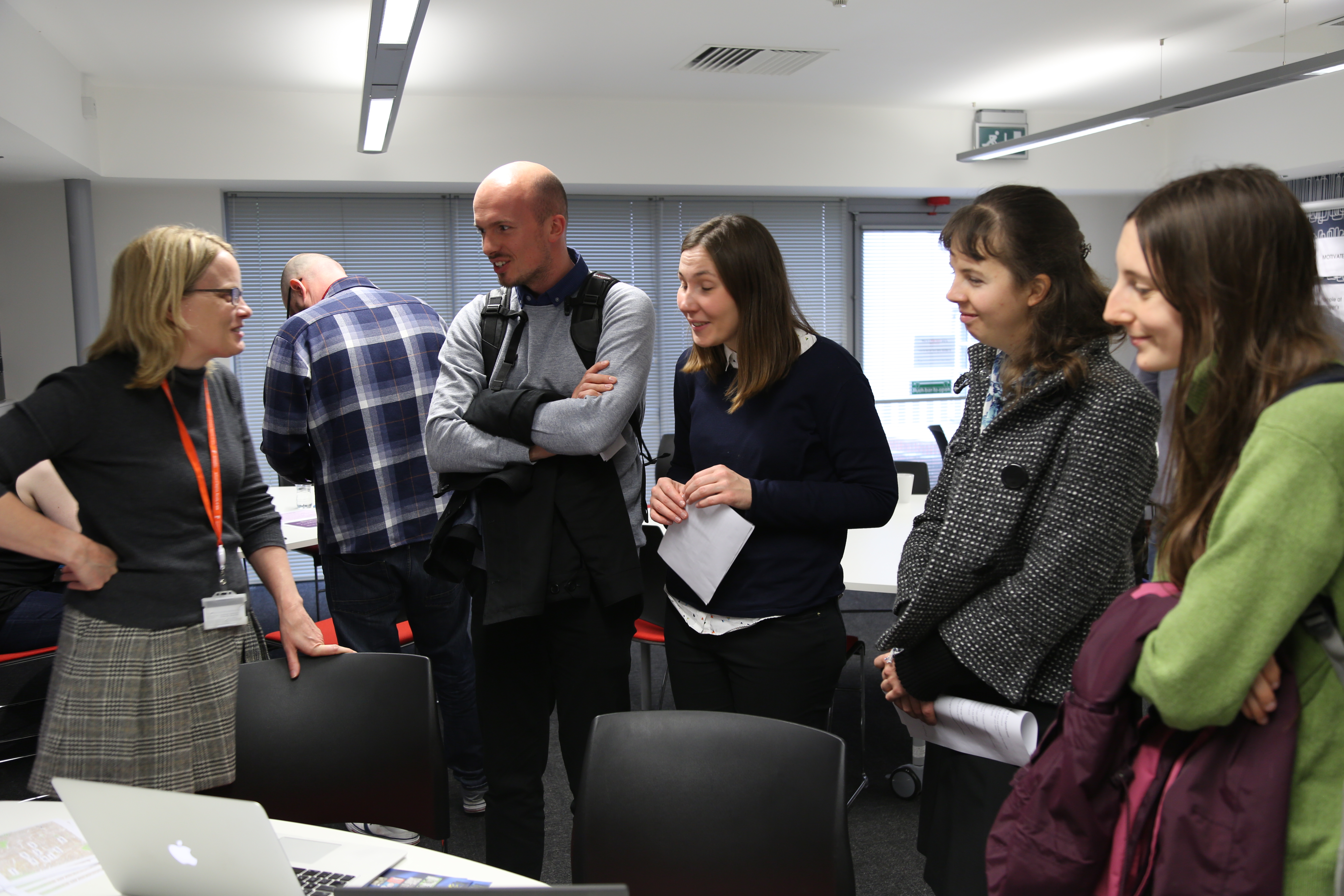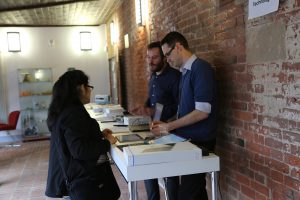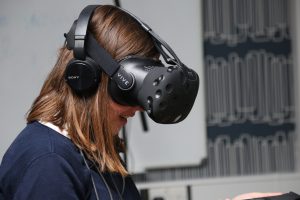
December 8, 2017, by Erin Snyder
Faculty of Arts Digital Day: A Showcase of Digital Teaching and Learning and Digital Research Projects
Staff from across the faculty gathered in Highfield House on 11th October for the Arts Digital Day, an afternoon where staff shared developments in digital teaching and learning and digital research. The event was introduced by Faculty PVC Professor Jeremy Gregory. Faculty APVC Mark Bradley gave an update on Education and Student Experience, during which he introduced the Faculty’s newly appointed Digital Learning Directors Cecilia Goria and Neil Hughes, who will be in post from January. The event provided a wide range of opportunities for attendees to try out the technologies while eating plenty of cake!
Mikiko Kurose (School of Cultures, Languages and Area Studies) spoke about recent updates to Rogō, the University’s e-assessment management system, to support ‘Ruby text’ (providing a short annotation of the associated base text). The Ruby annotation button was added to rogo in version 6.4 (released 9th October) as a direct result of Miki’s request. Miki showed how the new functionality has potentially wider application.

Members of the digital research team demonstrate handwriting technologies
Malgorzata Chalupnik (School of English) outlined the practical considerations involved in developing online CPD courses offered by the Linguistic Profiling for Professionals (LiPP) team based in the School of English. Malgorzata discussed how delivering MOOCs, and learning about how distance learning resources are accessed by their participants, emphasised the need to develop mobile and touch screen-friendly content. In her talk, Malgorzata also stressed the importance of developing interactive resources underpinned by pedagogical considerations, providing examples of how this has been achieved in the CPD courses. The work carried out by the team provides an illustration of the wider revision and revamping of distance learning provision in the School of English.
Andy Fisher (School of Humanities) showed how he uses Socrative to engage philosophy students in the classroom. Students are able to participate in polls using any mobile device without installing an app. The results can be shown in real time, enabling him to pose challenging questions to trigger discussions or to check knowledge and tailor a lecture to the needs of the students. Socrative has now been adopted more widely by staff in the Department of Philosophy.
Also on offer were demos of Mirroring360 (now installed on all lectern PCs), enabling easy sharing of device screens during classroom teaching or lectures, Xerte Online Toolkits, for creating interactive learning materials and Loan cameras and equipment along with information about the support available for video production and the new features in moodle 3.2
In the research section of the day, Alison Clarke spoke about the new Digital Research Strategy, part of the university’s Research Strategy. This will include substantial investment in the university’s facilities for data storage, research data management, and computation facilities.
Ginnina Birney also spoke about opportunities for colleagues from Arts to fund digital research equipment with UNICAS.

An attendee tries out a virtual reality experience
Hugh Houghton, Director of the Institute for Textual Scholarship and Electronic Editing at the University of Birmingham, provided our keynote talk, reflecting on “Challenges and Opportunities in Digital Textual Scholarship and Electronic Editing.” He discussed a history of computing projects in Theology, including projects that he’d been involved in, and then moved more broadly onto some of the challenges and rewards of taking digital approaches to text in a multidisciplinary, global context.
Finally, a very wide variety of research projects were represented in our Research Demos sessions, where colleagues from Arts presented their digital research. There were a range of sessions to try, from a recreation of a nineteenth-century photography exhibition in virtual reality, to a demonstration of handwriting technologies for automatic digitisation of handwritten notes, through to demos of a range of research projects including sound and image, augmented reality apps, online galleries, eye tracking software, and blended physical/digital artefacts.
With many thanks to our presenters:
Dominic Thompson and Fabio Parente – Eye-Tracking Technology
Stuart Moran – Handwriting Technologies
James Mansell – Sound and Fury: Listening to the Second World War
Paul Tennent – Mat Collinshaw’s Thresholds: Virtual Reality
Matt Davies – Introduction to the Digital Humanities Centre
Hannah Jefferey – AntiSlavery Usable Past
Liz Evans – Storytelling Objects
Jo Robinson – Our Theatre Royal Nottingham
Erin Snyder – Introduction to the Multimedia Online Archive Service
Will Bowden – Digital Interpretation at Caistor Roman Town
Dan O’Neill – People at Player’s
Weiqun Wang – The International Forum of Chinese Language Teachers Top 500
Erin Snyder and Sally Hanford, organisers
No comments yet, fill out a comment to be the first

Leave a Reply